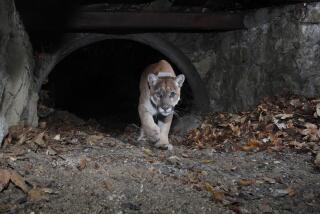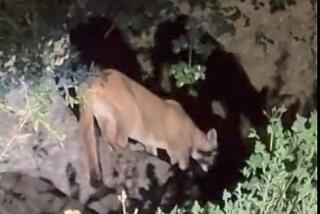Driving Out the Lions on Penny Lane
- Share via
The woman named Michelle explained it more clearly than any reporter could when she said there were lions among us.
She was using the phrase as a metaphor for abused children who themselves tend to be abusers, even though they have been given treatment.
“Just because you take a lion out of the wild doesn’t mean he’s going to stop being a lion,” she said. “A part of the jungle is always in him.”
We were in a small room at Penny Lane, a home for emotionally ravaged children in the San Fernando Valley.
Michelle, now 28, had been a resident there five years, a victim of unspeakable sexual and physical abuse by both parents.
“I have to be in a continual state of awareness not to do to my own two children what was done to me,” she said one cold and blustery afternoon. “There is always a danger.”
What was done to her by educated, financially comfortable parents defies credulity. She was continually raped by a father who used her as a second wife. She was savagely beaten by a mother who threatened to kill her.
“They had been abused,” Michelle said, “and they were passing it on to me. It’s a cycle, and when you’re a part of that cycle, you have to make an effort to be different . . . and being different is the hardest thing to do.”
She fled from her family through the jungles of her torment, and ended up on the streets as a violent, drug-addicted gangbanger. Arrested, she was sent to Penny Lane, where children go who live on the edge.
Now a senior at UC Santa Barbara as well as a parent, she remains removed from the lions within, but never clear of the memories. “Thinking back,” she says, “I saw Susan Smith in my mother’s eyes all the time.”
*
Smith is who sent me to Penny Lane in the first place. She’s the woman who confessed to killing her sons in a case that I can’t get out of my mind.
The faces of Michael and Alexander Smith float in my memory like the last images of a fading dream. I wanted to write something that would honor them.
Murder is the ultimate abuse of the young, but pain is a close companion. I found it in Michelle, in another Penny Lane “graduate” named Daysi and in other victims of childhood violence I spoke with in this season of children.
Pain entered their infancy with the suddenness of a lightning strike when they were too young to understand either its cause or its consequence.
Fists broke their bones, belts marked their backs, knives slashed their faces. Hatred was a palpable force in their violent households, a heat so fierce it burned their souls.
Daysi tried suicide twice while at Penny Lane and can’t tell you why. She fumbles for words and finally shakes her head in frustration. But she can remember with the clarity of a slow-motion film the belt in her stepfather’s hands, arcing through the air toward her face, its buckle slicing into her. . . .
“It’s that way with pain,” Michelle had said. “You wear it like a second skin.”
“For years,” a man named Carlos told me, “I woke up in the middle of the night with an unbearable ache in my legs and arms I couldn’t explain. Then one day I remembered. It was where I had been beaten by my father. The mind forgets, but the heart remembers.”
*
The name Penny Lane was taken from a Beatles tune about an ordinary street where children played and a barber trimmed the banker’s hair and a fireman polished his engine.
It rained on Penny Lane sometimes, but it was altogether a very nice place, a very normal place that one remembers with pleasure. “Penny Lane is in my ears and in my eyes
There beneath the blue suburban skies. . . .”
I didn’t ask why a home for emotionally damaged children had taken that name 25 years ago, but I suspect it was part of the rationale that went into its founding: to offer normalcy to young people who, for all of their short lives, had been without it.
Michelle and Daysi were among Penny Lane’s graduates. There have been about 2,500 of them since 1969. Their stories are distributed in press packets because they are neatly packaged essays of triumph over abuse.
Carlos too, though never the recipient of any help, has also made it, accepting with a stoic’s serenity and a philosopher’s fatalism the forces that have shaped his midnight pain.
But there were 140,000 known cases of child abuse in L.A. County last year, and not all of them will be Michelle or Daysi or Carlos. There will be lions among them, with a hunger too terrible to contemplate.






